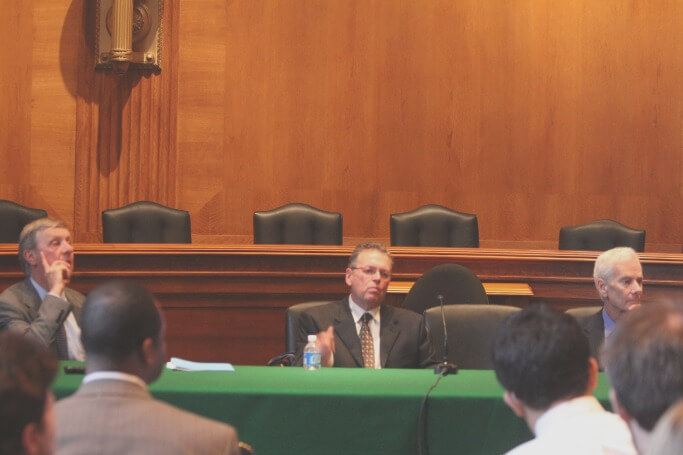It was less than an hour before the May 15 briefing was scheduled to begin when scientist Jim Cloern posed this question to a Senate Staffer: “So what is it that you are hoping to hear from us?”
COMPASS had invited Cloern, of the U.S. Geological Survey, along with his two long-time colleagues, Walter Boynton, from the University of Maryland Center for Environmental Science, and Scott Nixon, from the University of Rhode Island, to Washington, D.C. to brief Congress on what they had learned over their long careers in estuarine science. Together they represented a combined 116 years of experience studying San Francisco, Chesapeake, and Narragansett Bays. Over that time, these scientists have amassed a very long view on ecological well being of their respective water bodies.
It was that “long view” that COMPASS recognized as a potential way for these scientists to help shift the dialogue on Capitol Hill on the value of ecological monitoring – something often viewed as “not my job”, and as a burdensome, never-ending drain on financial resources. When money is tight, which is true now more than ever in the U.S., the budget for things like continually tracking the status of a system or monitoring a project’s effectiveness is often the first thing to go.
The Senate staffer paused before responding to Cloern’s question. Her answer came in the form of another question – one that gets at the heart of the challenge scientists face when trying to share what they know with policymakers: “We want to know, ‘What should Congress do?’”
This question is always on the mind of a policymaker, and it’s also the question that academic scientists are often least equipped to deal with. The role of science is not to tell policy makers what to do, so it’s no surprise that this question often gives scientists a lot of heartburn. But science does have a clear role to play. Scientists can help policy makers explore the “what if” consequences of different policy decisions. In this way, scientists bring their expertise to bear on the problem, but leave the final decision (correctly) in the hands of policymakers.
COMPASS helps scientists navigate the cultural divide between science and policy, and works with scientists to prepare them to talk directly with policy makers on Capitol Hill. In this case, our challenge was to help three stellar scientists, with great stories to tell, show policymakers why they should care about something as un-sexy as long-term ecological monitoring. They would need to be able to use their science to show what’s at stake. What might policy makers get if they choose to conserve and even enhance ecological monitoring in these tight fiscal times? What do they stand to lose if they choose not to?
Cloern, Boynton, and Nixon worked really hard. They worked and reworked their talks, they changed fonts and tweaked graphics. They struggled to make the “so what” of their science shine through. And, they worked to frame their science in a way that would resonate for a policy audience, that would at least help lay out ‘What might we do?’ Boynton gave a humorous nod to the entire process when he began his presentation by telling the audience, “I thought I had this great science talk ready to go when I first sent it to the COMPASS folks. What you are going to see today is version nine.”
Their efforts, and ours, paid off. Long-term ecological monitoring will never rival the importance of jobs, health care, or education in the eyes of Congress. But at the end of the day, a handful of the right people – Hill staff, folks at the Congressional Research Service and the Office of Management and Budget – have a clearer understanding of how the long view, provided by ecological monitoring, can help (and has helped) shape effective and accountable resource management across the country. And accountability and efficiency is something all good policy wonks can get behind.


